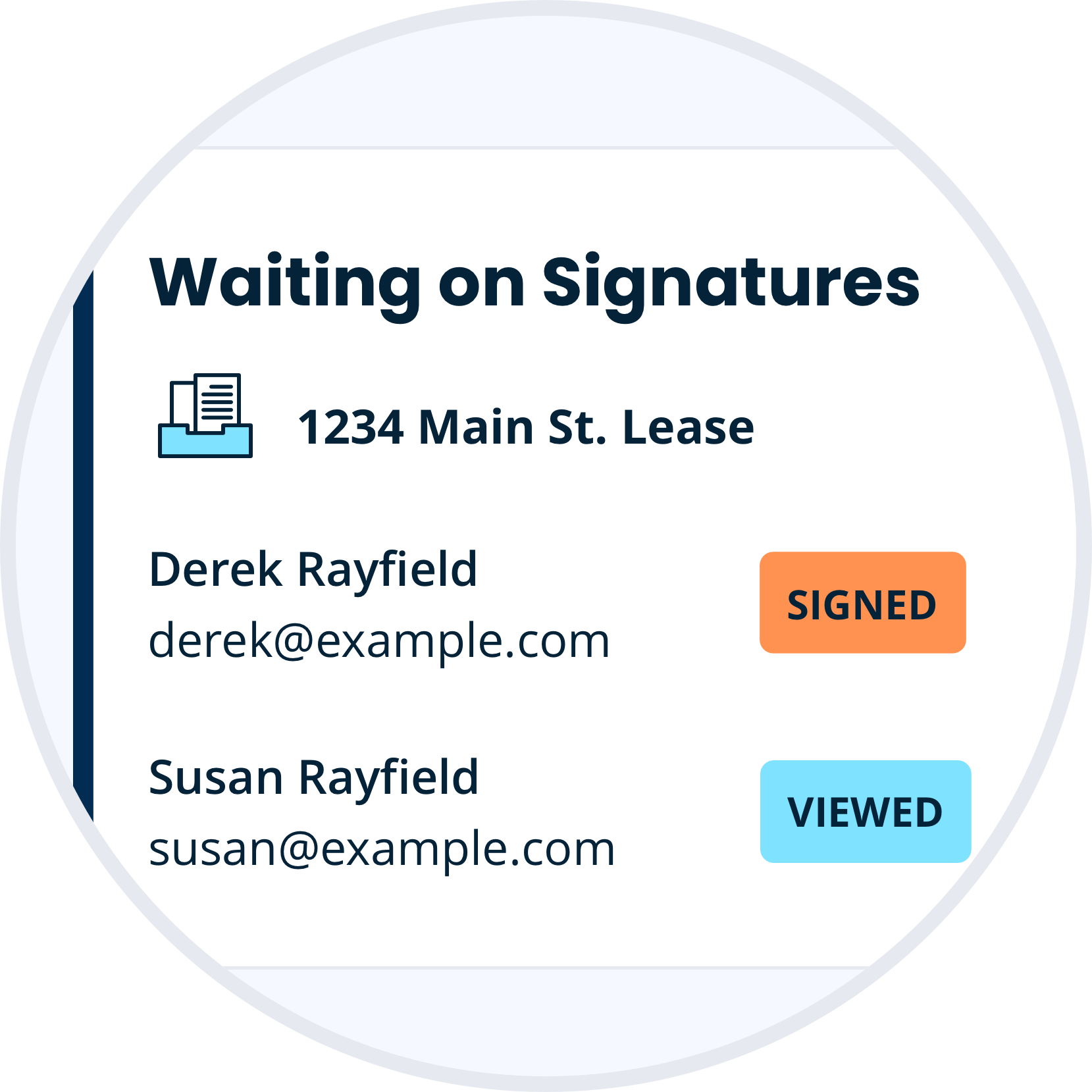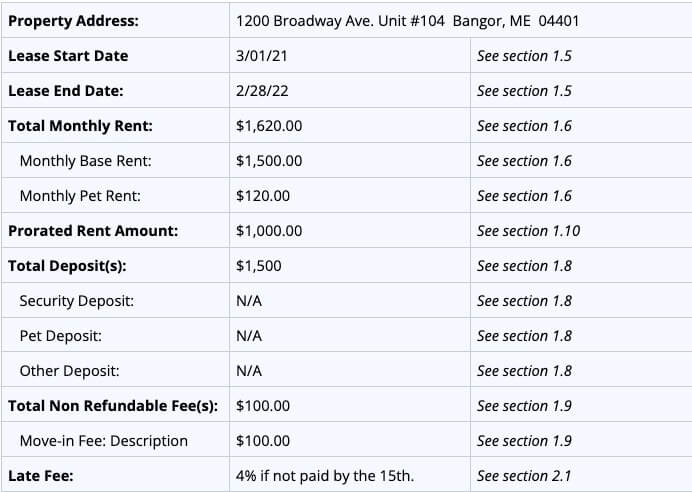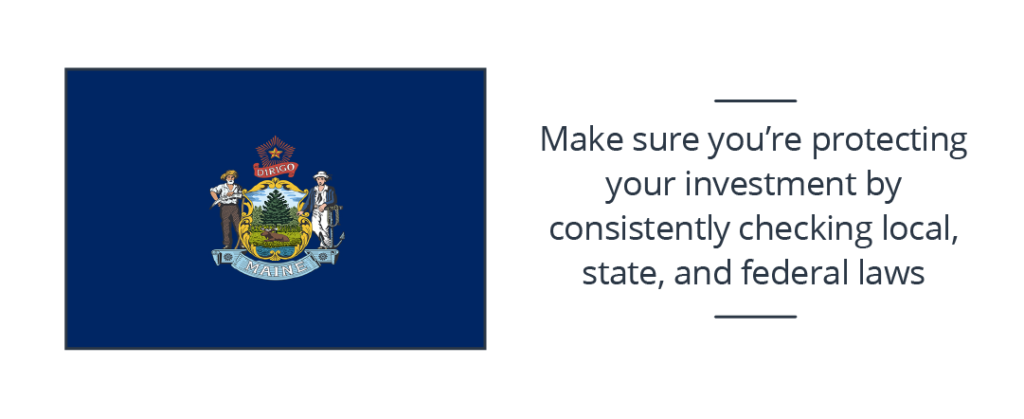Table of Contents
- Maine Renters’ Rights and Landlord Responsibilities
- Maine Landlords’ Rights and Tenant Responsibilities
- Rental Application Fee
- Criminal History Check
- Security Deposit
- Raising Rent
- Disclosures
- Maine Lease Agreement Example
- Maine Landlord-Tenant Law FAQ
- Due Diligence and Maine Rental Laws
- Maine Landlord-Tenant Law Resources
Maine has a low unemployment rate, which pairs nicely with one of the highest minimum wages in the country. Maine is also one of the safest states and has a smaller population, making it a great place to consider for those wanting to relocate. For those landlords considering purchasing rental property here, Maine ranks as a top 20 state for affordability.
Laws that impact the rental market, landlords, and tenants are constantly being decided in states. Make sure you know what’s on your ballot – find Maine voting information.

Maine Renters’ Rights and Landlord Responsibilities
- Have 30 days to return security deposit
- A 45-day notice required before raising rent
- Must give a reasonable amount of notice before entering
- Required to make repairs within 14 days
When it comes to Maine rental laws, there are a few specifics landlords need to know:
- Security Deposit – Maine limits the amount a landlord may charge for the security deposit to the equivalent of two months’ rent. Landlords must return the deposit within 30 days of the tenant moving out.
- Raising Rent – Landlords in Maine may increase the rent to any amount for any reason with a 45-day notice.
- Notice of Entry – Maine requires landlords to give reasonable notice before entering the property.
- Repairs – It is the landlord’s responsibility to keep the rental in safe and healthy living conditions. Landlords must make repairs within 14 days after being notified by the tenant. If the landlord fails to make repairs within this time frame, tenants may withhold rent, or make the repairs themselves and deduct up to $500 or half a month’s rent.
Maine Landlords’ Rights and Tenant Responsibilities
- Tenants have seven days to pay rent after they receive a notice
- Must give a 30-day notice before terminating a lease
- Tenants must keep the unit in a safe and habitable condition
- The landlord must store abandoned property and attempt to contact tenant
- Overdue Rent – If a tenant fails to pay rent on time, the landlord must give them seven days’ notice to pay or quit. If the tenant fails to pay, the landlord may file for eviction.
- Terminating a Lease – If a tenant needs to terminate a month-to-month lease, they must give the landlord a 30-day notice.
- Tenant Responsibilities – Tenants are required to keep the property clean, not disturb neighbors, and make small repairs.
- Abandoned Property – If a tenant moves out and leaves personal property, the landlord must notify them and store the property. After this period, if the property is worth more than $50, the landlord must turn it over to the State Treasurer.
Rental Application Fee
There are no additional rental application fee laws in Maine.
Criminal History Check
- HUD (Federal) laws do not classify criminal backgrounds as a protected class, but making a decision to rent based off a criminal background alone could lead to a discrimination charge as it impacts certain protected groups of people disproportionately.
- However, if the criminal background check revealed a crime for the manufacture and distribution of drugs, homicide and/or stalking, denying the application is allowed.
- Landlords should have a consistent and equal policy or procedure in place to follow regarding criminal background checks so as not to discriminate against one class of people over another.
- HUD states that a landlord cannot ask about arrest records, only convictions, as innocent people are commonly arrested though the situation may not have resulted in a conviction.
- Some municipalities may have written their own laws expanding onto what you can and cannot ask regarding criminal backgrounds during the tenant screening process.
Security Deposit
Landlords must hold security deposits in a bank or other financial institution.
Raising Rent
Landlords must give 45 days’ notice before raising rent 10% or less. For rental increases over 10%, landlords must give 75 days’ notice.
Disclosures
- Beg Bugs – Landlords must disclose if the unit or surrounding units ever had a bed bug problem.
- Radon – Information regarding testing and mitigation of radon levels must be disclosed.
- Common Area Utilities – Landlords must disclose if tenant is responsible for paying a share of common area utilities.
- Security Deposit Holding – The location and account number of the bank where the security deposit is held must be disclosed upon request.
- Smoking Policy – The smoking policy must be clearly disclosed for the unit.
Build a Maine lease agreement in less than 15 minutes.
Maine Lease Agreement Example
There are three sections to a residential lease agreement. The first section outlines the custom details of the contract, such as who’s involved and for what address. Here’s an example Maine lease agreement listing details found in Section 1:
Maine Landlord-Tenant Law FAQ
Below are answers to some of the most commonly-asked questions when it comes to landlord-tenant laws in Maine:
Can You Withhold Rent in Maine?
Yes. Tenants may withhold rent if a landlord fails to make requested repairs.
How Long Does it Take to Evict a Tenant in Maine?
Evicting a tenant in Maine can take anywhere from one to two months, depending on the reason for eviction.
Is Maine a Landlord-Friendly State?
Maine is a landlord-friendly state because of the lack of rent control laws.
What is the Eviction Process in Maine?
There are five reasons a landlord may file for eviction in Maine. The five reasons include failure to pay rent, violation of the lease agreement, the end of the lease term, safety violation, and illegal activity. Depending on the violation, the landlord must give the tenant notice and anywhere from 7 to 30 days to cure their violation.
If the tenant fails to cure or quit, then the landlord may file a complaint with the court, which costs $100. After the complaint is filed, it will be served to the tenant at least seven days before the hearing.
After the tenant is served with the summons, the hearing will be scheduled within 10 days.
If the court rules in favor of the landlord, then a writ of possession will be issued seven days later. The tenant will then need to move out within 48 hours.
How Much Notice Does a Landlord Have to Give a Tenant to Move Out in Maine?
Landlords must give a 30-day notice before asking a tenant to vacate the property.
Due Diligence and Maine Rental Laws
TurboTenant has utilized many municipal sources along with official state statutes in order to compile this information to the best of our ability. However, local laws are always in flux, and landlords and tenants alike should do their due diligence and consult legal help when it’s needed. We hope the following list can serve as a valuable resource and allow you to succeed as a landlord or tenant in Maine. Be sure to take proper precautions when it comes to finding the top candidates for your unit by utilizing our online rental application and tenant screening services.
Disclaimer: TurboTenant, Inc does not provide legal advice. This material has been prepared for informational purposes only. All users are advised to check all applicable local, state, and federal laws, and consult legal counsel should questions arise.

Unlimited Everything.
Create a single Maine lease agreement, or subscribe and receive unlimited lease agreements, landlord forms pack, and e-signs for a simple annual fee. Be confident with all the legal forms and tools you need as a professional landlord.
Discover Our Unlimited PlanMaine Landlord-Tenant Law Resources
- Subchapter 1: RESIDENTIAL LANDLORDS AND TENANTS LAW
- Chapter 710-A: SECURITY DEPOSITS ON RESIDENTIAL RENTAL UNITS LAW
- Title 14, Chapter 710: RENTAL PROPERTY
Maine Fair Housing Resources
Other State Resources
- Consumer Rights When You Rent an Apartment
- Attorney General’s Model Landlord-Tenant Lease
- Maine – Rental Housing Guide- Maine State Housing Authority
- Landlord Obligations & Information – Maine State Housing Authority
- Maine Landlord and Tenant Duties – National Conference of State Legislatures
Maine Associations
Maine City-Specific Housing Resources
Portland
Lewiston
Bangor
- Required Radon Testing for Multi-Family Homes – City of Bangor
- Greater Bangor Association of REALTORS®
South Portland
Federal Fair Housing Resources







